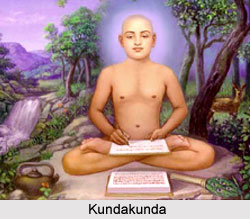 Kundakunda was a celebrated Jain Acharya as well as a Jain scholar monk of the 2nd century AD. He was a highly knowledgeable man who is credited with composing many divine classics. Few of the divine classics composed by him are Samayasara, Niyamasara, Pancastikayasara, Pravacanasara, Atthapahuda and Barasanuvekkha. Among the tradition of the Jain acharyas he occupies the highest place.
Kundakunda was a celebrated Jain Acharya as well as a Jain scholar monk of the 2nd century AD. He was a highly knowledgeable man who is credited with composing many divine classics. Few of the divine classics composed by him are Samayasara, Niyamasara, Pancastikayasara, Pravacanasara, Atthapahuda and Barasanuvekkha. Among the tradition of the Jain acharyas he occupies the highest place.
Acharya Kundakunda belonged to the Mula Sangh order. His actual name was Padmanandi. He is popularly referred to as Kundakunda because he was born in a place named Kaundakunda in South India. He is closely linked with the Digambara Sect or denomination. In the recent decades, his texts have also become popular among the Shwetambar denomination He was known by the names like Padmanandi, Elacharya, Vakragriva and Grddhapiccha.
For the members of the Digambar denomination, the name of Acharya Kundakunda has propitious significance and occupies third place after Lord Mahavira and Gautama Ganadhara in the sacred litany. Kundakunda wrote in Shauraseni Prakrit. He had many followers and amongst the modern devotees of Kundakunda, two names are notable. One of them was Banarasidasa, a 16th century lay poet from Agra who began his divine quest after reading kundakunda`s "Samayasara". The other follower was Rajachandra, a Gujarati merchant who practised and followed the divine path highlighted by Acharya Kundakunda.
This article is a stub. You can enrich by adding more information to it. Send your Write Up to content@indianetzone.com



















